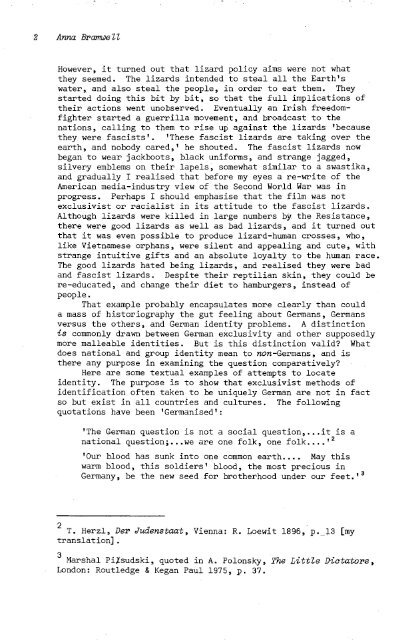Download searchable PDF of Volume 16 1985 - Institute of Social ...
Download searchable PDF of Volume 16 1985 - Institute of Social ...
Download searchable PDF of Volume 16 1985 - Institute of Social ...
Create successful ePaper yourself
Turn your PDF publications into a flip-book with our unique Google optimized e-Paper software.
2 Anna Bramwell<br />
However, it turned out that lizard policy aims were not what<br />
they seemed. The lizards intended to steal all the Earth's<br />
water,and also steal the people, in order to eat them. They<br />
started doing this bit by bit, so that the full implications <strong>of</strong><br />
their actions went unobserved. Eventually an Irish freedomstarted<br />
a guerrilla movement, and broadcast to the<br />
nations, calling to them to rise up the lizards 'because<br />
they were fascists'. 'These fascist lizards are taking over the<br />
earth, and nobody cared,' he shouted. The fascist lizards now<br />
to wear jackboots, black uniforms, and strange jagged,<br />
emblems on their lapels, somewhat similar to a swastika,<br />
and gradually I realised that before my eyes a re-write <strong>of</strong> the<br />
American media-industry view <strong>of</strong> the Second World War was in<br />
progress. Perhaps I should emphasise that the film was not<br />
exclusivist or racialist in its attitude to the fascist lizards.<br />
Although lizards were killed in large numbers by the Resistance,<br />
there were good lizards as well as bad lizards, and it turned out<br />
that it was even possible to produce lizard-human crosses, who,<br />
like Vietnamese orphans, were silent and appealing and cute, with<br />
strange intuitive gifts and an absolute loyalty to the human race.<br />
The good lizards hated being lizards, and realised they were bad<br />
and fascist lizards. Despite their reptilian skin, they could be<br />
re-educated, and change their diet to hamburgers, instead <strong>of</strong><br />
people.<br />
That example probably encapsulates more clearly than could<br />
a mass <strong>of</strong> historiography the gut feeling about Germans, Germans<br />
versus the others, and German identity<br />
A distinction<br />
is commonly drawn between German exclusivity and other supposedly<br />
more malleable identities. But is this distinction valid? What<br />
does national and group identity mean to non-Germans, and is<br />
there any purpose in examining the question comparatively?<br />
Here are some textual examples <strong>of</strong> attempts to locate<br />
identity. The purpose is to show that exclusivist methods <strong>of</strong><br />
identification <strong>of</strong>ten taken to be uniquely German are not in fact<br />
so but exist in all countries and cultures. The following<br />
quotations have been 'Germanised':<br />
'The German question is not a social question,...<br />
national question; ••• we are one folk, one folk •••• '<br />
'Our blood has sunk into one common earth •••• May this<br />
warm blood, this soldiers' blood, the most precious in<br />
Germany, be the new seed for brotherhood under our feet.'s<br />
a<br />
2 T. Herzl, Der Judenstaat, Vienna: R. Loewit 1896, p ... l3 [my<br />
translation] •<br />
3 Marshal Pilsudski,<br />
London: Routledge &<br />
A. Polonsky, The Little Dictators,<br />
1975, p. 37.
















